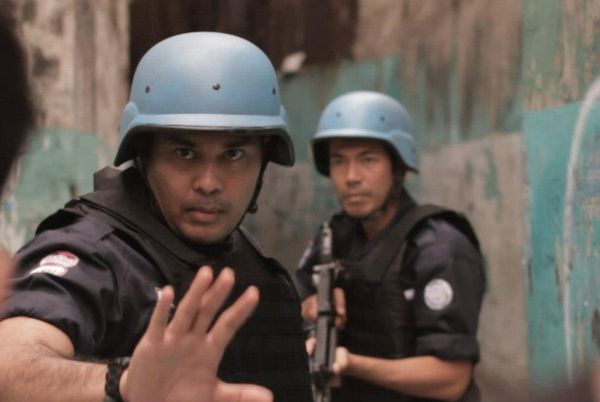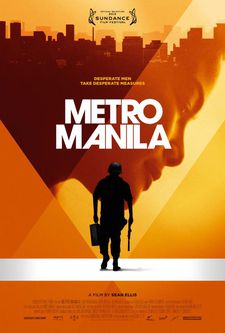 |
| John Arcilla and Jake Macapagal as Ong and Oscar in Sean Ellis' Metro Manila |
Speaking to him ahead of Metro Manila's release in the UK on September 20, the Brighton-born filmmaker said: "I think it's a great thing and Fox International has obviously seen potential in the remake and I can understand that because it's obviously a very universal story.
"Obviously, it was culturally specific but I think that universal story can be set anywhere. My understanding is that Fox is looking to make a number of remakes in different languages, so that they actually make product for different countries.
 |
| Metro Manila director Sean Ellis at Sundance London |
The film is entirely shot Tagalog - “I just couldn’t imagine going to the Philippines and making a film there where the actors spoke English." - and the decision adds to the film's documentary feel, particularly in its early stages, and authenticity. Did the decision also help Ellis to keep the scripting tight, with visuals being used to tell the story rather than relying on the crutch of dialogue?
"It was that and it was also tearing down what was not needed," he sid. "The old saying, 'show don't tell'. Because I knew it was going to be a subtitled film and because it had been structured like a subtitled film, I didn't just want there to be constantly reading subtitles. So if there was a way of us doing it without it having it to be said - sometimes it's more powerful that way - that was the way that we did it.
"It's very interesting because it was structured like a subtitled film, it influenced the edit, if you like, because we knew that at a certain point when people are reading subtitles, they're not looking at the screen. So we would allow for that and make edits slightly longer or shorter, given that we knew people would be reading subtitles. Whereas, most foreign films get finished, edited and then the subtitles get put on."
 |
| Oscar (Jake Macapagal), Mai (Althea Vega) and Angel (Erin Panlilio) in Metro Manila - ' I wanted us to have empathy with them and understand the plight of their journey'. |
"I think coming off The Brøken, I was very much... I think the trouble with The Brøken was it was visuals leading the story," he said. "I learnt a lot from that and with this, I definitely wanted the story to be leading the visuals. So with this is was basically, story, story, story with this one."
It's a decision that pays off, with Metro Manila gripping on an emotional level as its thriller elements build to a strong climax. The early part of his film a documentary-like authenticity, so was that his intention?
"It was," he said. "First of all, we had a very small budget on it. So, how do you stretch your budget? One way of doing that is having a very small crew and having a very small crew means that you shoot like a documentary crew.
"I was operating and focus pulling and sound recording, so I had to have a camera that I could do it all on board. So, that kept the budget down in that respect and enabled us to move around and shoot a lot. Secondly, what's nice about shooting in a documentary style is that you're adding all the sort of sense of documentary coda to the fiction. So the fiction feels more realistic because the coda is, we're used to documentaries being hand-held and in/out focus and camera reaction to stuff and people even looking into the lens. These are the sorts of things we see in documentary, so I introduced a number of these into the making of the fiction, so what you get is a result that it feels more realistic, that you're actually following the plight of this family as a documentary rather than a piece of fiction."
The director's films often cross genre - Cashback was described as everything from a drama through to a romantic comedy and as Ellis told me back in 2008 "I don't really want to carry on making the same film for the rest of my life.". Here he manages an enviable balance between human drama and heist in a way that keeps the audience on its toes.
 |
| Jake Macapagal and Althea Vega in Metro Manila - 'What's nice about shooting in a documentary style is that you're adding all the sort of sense of documentary coda to the fiction.' |
Ellis' directorial choices are particularly interesting in that he takes time to let the drama of story take hold, holding back the thriller elements, so that by the time the more action-oriented portion of the script kicks in we're fully invested in what happens to Oscar and his family.
"It's the migration story of the family at the beginning that's going to go into this really dark place," said Ellis. "So, I wanted us to have empathy with them and understand the plight of their journey. We did a cut that had a much quicker beginning, where they got on the journey a lot quicker and it was funny because it didn't work as well. A lot of people weren't as invested, they hadn't taken the journey.
When I spoke to Ellis previously, he said he was keen to make a war film, is that project any closer to coming to life and will he be building on the experience of Metro Manila?
"I'd love to make a war film, I really would. I'm developing with Lionsgate at the moment, which is a military film, which is very interesting. Very different again. Back in English.
"I'd be an idiot if I didn't take what I'd learned on every project to the next one. I would like to carry on making films in languages I don't speak because it's a really interesting process for me personally - being able to go round the world and find these very country specific areas and tell heartwarming and universal stories within them."
 |
| Metro Manila UK poster |
Metro Manila is released across the UK on September 20 by Independent. Paladin and 108 Media have the North American rights to the film but no US release date has yet been set.





















